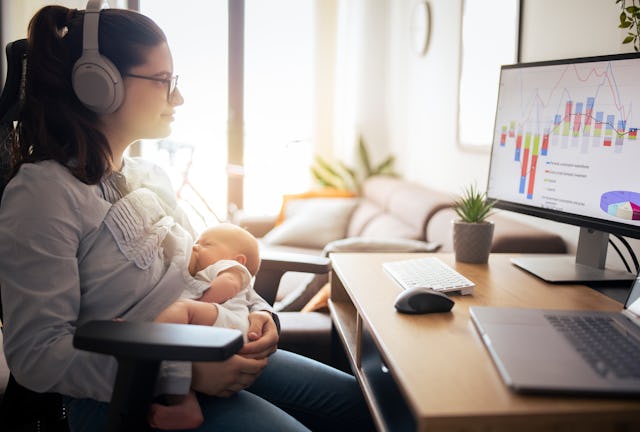A CEO Posted A Photo Breastfeeding While Working At Home & The Comments Did Not Pass the Vibe Check
“If I were a male CEO, no one would ask who was taking care of the baby while I worked.”

When Lisa Conn returned to her tech startup Gatheround, from her maternity leave in March 2023, she started a new position as CEO of the entire company. No big deal.
Before she had her baby, she had been chief operating officer and co-founder of the start-up. When she announced her new role on LinkedIn (as one does), she shared a photo her husband had taken a few days into her new role as a new mom. The photo shows Conn working at her desk, breastfeeding her then-12-week-old baby while leading a team meeting online.
The post got a lot of attention, gaining nearly 5 million impressions, 45,000 reactions, thousands of comments, and hundreds of reposts. The photo also helped business soar. According to a Fortune article Conn wrote about the viral photo, “inbound requests for demos of our platform tripled. And our volume of unprompted job applications skyrocketed overnight.”
While business was suddenly booming, and while Conn received an outpouring of love and support from so many LinkedIn users, she was also bombarded with a metric ton of judgement, misogyny, and so many unwanted and outdated opinions, from both men and women.
Not to mention lots of false information, seething hatred, and condescension.
“That's not an achievement neither something beautiful!” one LinkedIn user wrote on Conn’s post. “I see a baby in front of a screen because momma has to keep on working. Why you had this baby in the first place? If you are not able to sacrifice and dedicate at least the first months of your time to that baby what kind of a mom are you?”
The archaic, cringey comment dripping with misogyny stuck out to Conn who couldn’t help but respond.
“I am a wonderful mom. And my baby has a wonderful father, grandparents, aunts and uncles, and friends who all contribute. She is never without love, attention, or care. Sending you love ❤️,” she wrote back with more restraint than many could probably muster.
“This looks sad to me and not like a celebration,” another woman wrote of the picture — one of hundreds of negative comments that were judgmental of her decision to work, her decision to go back to work, her decision to nurse while working, and on and on and on.
In 2023, women are expected to work like they don’t have kids, and raise kids like they don’t work. It is an utter Catch-22 for any working mother who wants to feel successful in their career while also being a good mom who raises happy, healthy humans.
Why is it that dads never seem to have this dilemma?
“If I were a male CEO, no one would ask who was taking care of the baby while I worked,” Conn wrote.
Conn’s photo was also a message to companies who are less flexible when it comes to remote work. In a seemingly post-pandemic work, several companies have called upon their employees to start coming back to the office to work, including Disney, Dell, Amazon, Starbucks, and Walmart.
“Remote work absolutely changes the lives of parents and children. Anyone who wants to turn back that clock and send us back to the office full time really doesn’t know what they’re losing,” another user and mom wrote on Conn’s post.
Conn notes that 89% of American workers agree that mothers in leadership brings out the best in employees, and a 2021 study found that corporate organization improves when at least three board seats are held by women.
Even though it’s clear that women in power is good thing, just 26% of executives are women, and a recent Pew study found that only 24% of working mothers identify themselves as a top manager.
“To elevate more women to leadership positions, we need mandated paid leave, equitable hiring practices, and accessible, affordable childcare,” Conn wrote, recognizing her privilege. “This support is particularly important for BIPOC women, for whom motherhood is estimated to reduce earnings by an average of 20%, as compared to 10.2% for white women.”
CNN recently reported that moms are leaving the workforce at alarming rates due to the rising costs of childcare. However, with flexibility, Conn believes women can have successful careers and a fulfilling motherhood journey.
“When I’m working with the comfort of knowing that my daughter is napping just a room away, I live the promise of flexible work. It isn’t a pipe dream,” she wrote. “It’s my reality and it can be the reality for many other working mothers if leaders embrace this opportunity to get flexible work right.”
The bottom line here? It should be up to women to decide what their careers look like, before, during, and after maternity leave. And our work culture should protect women’s freedom to make the career choice that works best for her and her family. It’s not hard!
This article was originally published on